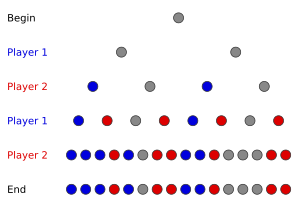
- Image via Wikipedia
Some look at acquisition as a purely dog-eat-dog zero sum game.
Another perspective coming out of game theory that takes a slightly different approach than the “Always Trust” strategy is documented in a Robert Axelrod‘s “The Evolution of Cooperation” . There are games where the strategy of “Always Trust” or Don’t Play” may not be feasible or acceptable. The book describes how cooperation can emerge in a world of self-seeking egiosts – whther superpowers, businesses or individuals- when there is no no central authority to police their actions.
It may be that the defense acquisition is such a game, where walking away from equipping the force is not an option, and we have a limited number of OEMs to work with, and the needs of the nation and the directives of political leaders directs action within a set of constrained choices. It may be this is a game where we must play, in some fashion, and yet where absolute trust is not realistic, yet players have learn and adapt.
Using computer models of a game called “iterated Prisoner’s Dilemma” and expanding on the promising results to include the perspectives of evolutionary biology, Alxelrod shows how trust can evolve and improve results when conditions of absolute trust are not in place.
Short answer: there is powerful evidence that a simple strategy that starts off with trust and then mirrors the partner’s last move is robust and successful. The book examines in detail why this is successful, how it can gain a foothold in a comopetitive arena. how it compares to other more sophisticated strategies, and how it can resist the invasion of othe conpetitive strategies as the “game” continues.
This book’s description of learning adapting “emergent” and successful self-organization strategies was ground breaking in 1984 and still can inform our perspective today.
It may be that adopting “energent managemnet strategies”, where simple rules, wioth many feedback cycles, and real rewards and punishments applied in meaningful ways may allow for improvements in the results of this complex adaptive system of defense acquisition and force development. All theory and much practice can point to the predictable and reliable underperformance of rational analytical control models trying to manage a political process.
Axelrod, R., (1984) The Evolution of cooperation. Harper Collins. New York.
Related articles by Zemanta
- Book review: “Nonzero: The Logic of Human Destiny” by Robert Wright (eli.thegreenplace.net)
- ENDA and the LGBT Prisoner’s Dilemma (bilerico.com)
- Imitators dominate innovators in a virtual world (arstechnica.com)
- Health Reform: A Prisoner’s Dilemma (swampland.blogs.time.com)
- Innovation By Imitation: Study Shows That Success Comes From Imitation (techdirt.com)
- ENDA and the LGBT Prisoner’s Dilemma (pinkbananaworld.com)
- Game Theory In The Arab World (cehwiedel.com)
- Social is a Hybrid: Either everyone owns it, or no one. (socialmediatoday.com)
- Game theory shows evolution follows most successful member (arstechnica.com)
- Dod-eat-dog vs cooperation in military acquisition (kansasreflections.wordpress.com)

![Reblog this post [with Zemanta]](http://img.zemanta.com/reblog_e.png?x-id=3330200f-07f1-4b71-80fb-076c5b15effa)